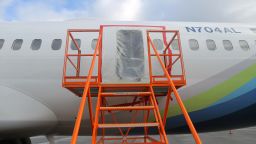The Alaska Airlines incident on January 5 that left a hole in the fuselage of a Boeing 737 Max 9 aircraft shortly after takeoff from Portland, Oregon, raised important safety questions, prompted investigations – and left some air travelers on edge.
After the incident that caused no deaths, the Federal Aviation Administration grounded all US 737 Max 9 aircraft that have the door plug feature until the planes could be thoroughly inspected. While questions flew in ensuing days, the planes stayed on the ground.
Roughly three weeks later, the grounded Max 9’s are set to return to service. Here’s what CNN Travel knows about the current 737 Max 9 situation and what air travelers need to know:
What has the FAA decided on the Max 9’s?
The FAA has approved a process to allow the Boeing 737 Max 9 to fly again. That move clears the way for airlines to begin inspecting the planes so that they can be OK’d to fly.
Each of the 171 grounded aircraft must undergo the process. That includes inspection of the bolts, fittings and guide tracks for the door plug, the piece of fuselage that flew off an Alaska Airlines plane earlier this month. It also includes tightening fasteners and performing “detailed inspections of … dozens of associated components.”
“This aircraft will not operate until the process is complete and compliance with the original design is confirmed,” the FAA statement said.
Alaska Airlines and United Airlines were the US carriers most-affected by the grounding.
What are Alaska Airlines’ plans?
Alaska Airlines plans to return some of its 737 Max 9 planes to service on Friday, the company said Wednesday in a news release.
“Each of our aircraft will only return to service once the rigorous inspections are completed and each aircraft is deemed airworthy according to the FAA requirements. We have 65 737-9 MAX in our fleet. The inspections are expected to take up to 12 hours for each plane,” the airline said.
The airline said Thursday that it expects its all of its Max 9 planes to be flying in the first week of February.
Click the link to check Alaska Airlines’ travel policy.
What are United Airlines’ plans?
On Thursday, United Airlines said it is adding the Max 9 back to its schedule starting Sunday. But the Max 9 could carry some United passengers as soon as Friday.
That’s because Max 9s that have been inspected and cleared according to FAA instructions will be available as “operational spares,” according to the airline.
So if the airline was going to cancel a flight because of a mechanical issue, but a cleared Max 9 is available at the airport, it can be used as a substitute aircraft.
Click here for United Airlines’ latest travel alerts.
What’s the future of the Max?

In a word: Uncertain.
Along with announcing the inspection process to get grounded Max 9’s into the air, the FAA told Boeing that “it will not grant any production expansion of the MAX, including the 737-9 MAX,” the agency said in its news release.
“Let me be clear: This won’t be back to business as usual for Boeing,” FAA Administrator Mike Whitaker said.
“We will not agree to any request from Boeing for an expansion in production or approve additional production lines for the 737 MAX until we are satisfied that the quality control issues uncovered during this process are resolved.”
Is it still safe to fly?
In clearing the Boeing 737 Max 9 to fly following rigorous inspection, the FAA is saying “yes.” FAA Administrator Whitaker underlined that point to CNN’s Pete Muntean earlier this week.
“If the aircraft is ungrounded, that means that we believe it’s airworthy. And if it’s airworthy, the aircraft is safe. I can say that we’re not going to let that aircraft back in the air until we’re convinced that that issue has been taken care of,” Whitaker said.
CNN transportation analyst Mary Schiavo on Thursday pointed to some “very dramatic things” that the FAA is doing in response to the Alaska Airlines incident, including sending dozens of inspectors to perform hands-on inspections at Boeing and its crackdown on Max production.
“So when the FAA administrator says, ‘yes, the planes are safe because we say they’re safe to fly,’ what he’s really saying is the aircraft meets the certification requirements we have put in place for the aircraft,” said Schiavo, former inspector general of the Department of Transportation.
“But with the FAA putting all of these new resources in play, it will certainly help the safety of Boeing. But Boeing’s not out of the woods yet. The FAA in doing a deep-dive will find additional problems … but, they will fix them.”
Kathleen Bangs, a former airline pilot, said shortly after the Alaska Airlines incident that she understands “why people are frustrated – and nervous – about this,” noting that it’s just been a couple of years since another member of the Max family of aircraft, the Boeing 737 Max 8, was returned to service after being grounded for nearly two years.
That followed two fatal crashes attributed to problems with the aircraft’s automated Maneuvering Characteristics Augmentation System, or MCAS.
Bangs said she was impressed with the FAA’s “right decision” to quickly ground the Max 9 on January 6, a move it was slow in making for the Max 8.
She also acknowledged Boeing’s “quality control issue.”
But Bangs said she believes that authorities will ensure that all of the door plugs are secure, “but I certainly understand, when you add that to the problems of the Max 8, why people are getting nervous about flying on this particular version of the 737.”
Bangs said she’s not nervous, and she added that she’s confident that once an issue has been identified and addressed, it is safe.
How can I find out my type of plane?
Bangs pointed out potential passengers can see what kind of equipment the flight is operating on in the “details” section when they book flights.
FlightAware’s Where is My Plane feature will also provide the specific airplane model and tail number registration.
Scott Keyes, founder of travel site Going.com, explained that “when you purchase a flight, it will say on your receipt what aircraft you’re scheduled to fly (typically near the flight number).”
But be prepared for last-minute changes, Keyes warned. “Do note that aircraft swaps happen occasionally; what you were originally scheduled to fly is usually but not always the same model you ultimately fly.”
In that case, Bangs said passengers can use the tail number of the plane at the gate to double-check the type of aircraft.
This story was updated on January 25 from previous versions. CNN’s Gregory Wallace, Joe Sutton, Hanna Ziady, Paradise Afshar, Eva Rothenberg, Jordan Valinsky, Ross Levitt and Pete Muntean contributed to this report.






